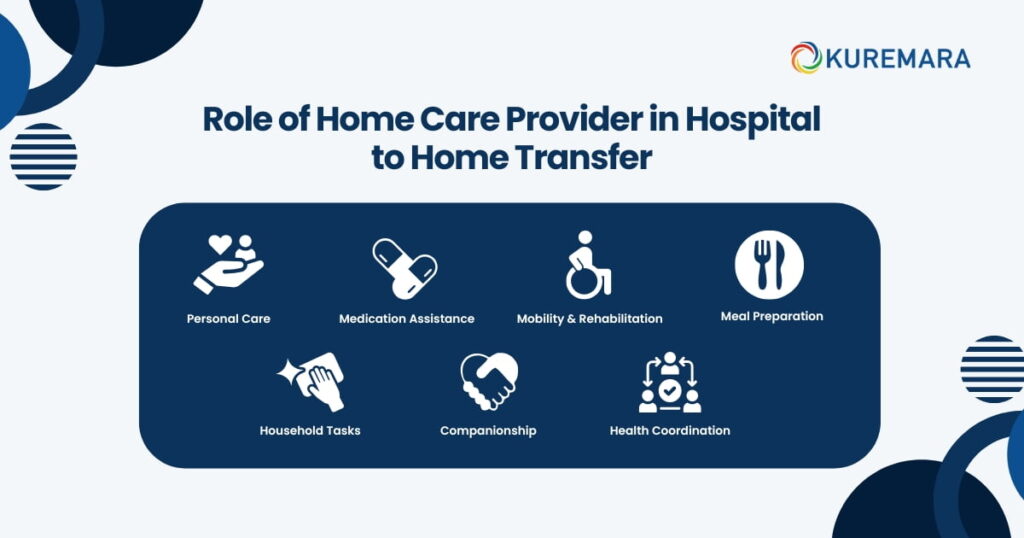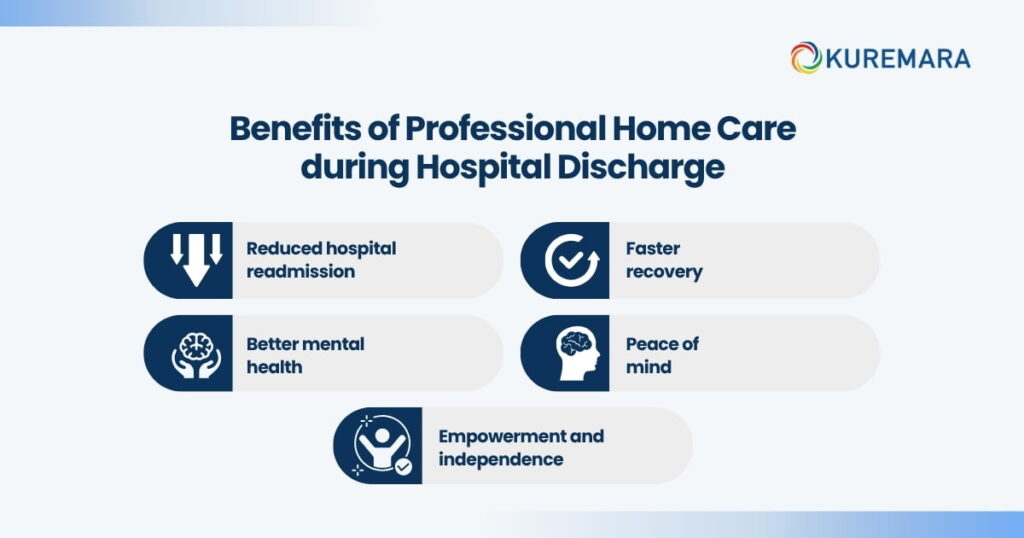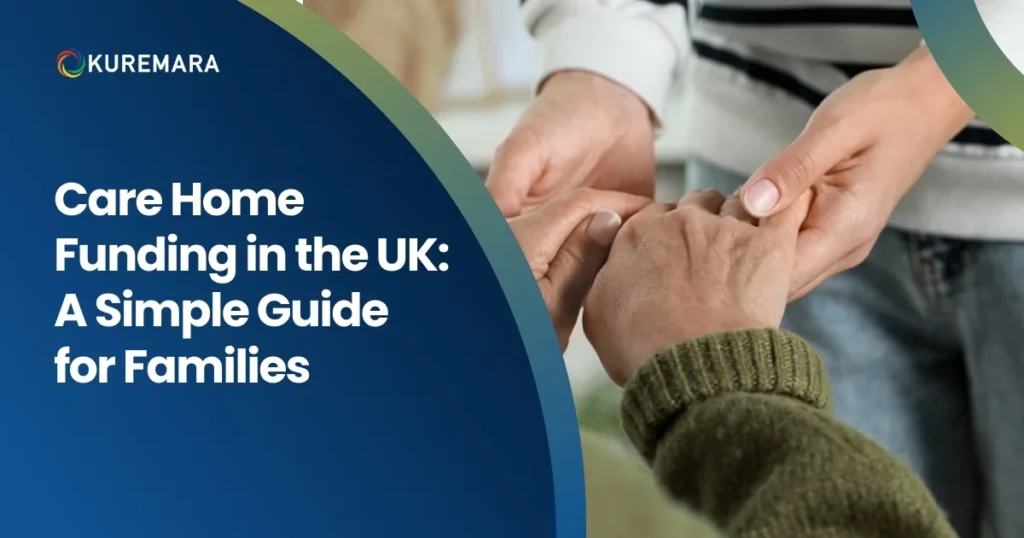The Often-Overlooked Challenge: Transitioning from Hospital to Home
Leaving the hospital can feel like a major relief, but for many individuals and their families, it marks the beginning of a new challenge. The journey from hospital to home is rarely simple. While the medical care in a hospital setting is intensive and continuous, the shift back to a home environment can be overwhelming, especially when recovery needs are complex.
This transitional phase, often referred to as a “care gap”, can result in missed medications, delayed recovery, and emotional strain. Without the right support system in place, even the strongest families may find it difficult to manage.
That’s where home care services become a vital lifeline. With the right home care support, recovery can be safer, smoother, and more empowering. In this guide, we’ll explore the discharge process, the role of home care providers, and how Kuremara ensures a compassionate and coordinated recovery journey.
Beyond the Hospital Doors: Understanding the Discharge Process
Discharge isn’t just about getting home; it’s about being ready for home.
Hospital discharge is a multi-layered process requiring careful planning and thoughtful coordination. It involves more than a signature and a send-off. Each patient’s discharge plan must account for:
- Medical needs: Ensuring timely follow-up appointments and wound care, if required.
- Medication management: Preventing errors and ensuring adherence to new prescriptions.
- Mobility & physical recovery: Managing walking aids, exercises, and safe transfers.
- Emotional well-being: Tackling fear, anxiety, or loneliness that may surface post-discharge.
- Home environment safety: Making adaptations to reduce fall risks or accommodate assistive devices.
Without appropriate planning, the risk of readmission increases dramatically. Families often feel ill-equipped to provide clinical or emotional support, especially when changes in daily function or cognition have occurred. This is where timely and coordinated home care becomes essential.
The Role of a Home Care Provider: Your Bridge to Recovery
Professional home care providers serve as the critical link between hospital care and life at home. Their role is not just supportive; it’s transformative.
Personalised, Compassionate, and Practical

At the heart of professional home care lies personalisation. Every individual has unique needs, and a one-size-fits-all solution simply doesn’t work. A home care provider creates a customised recovery plan to meet clinical, functional, and emotional needs.
Here’s how they support post-hospital recovery:
- Personal Care: Support with bathing, grooming, dressing, and toileting.
- Medication Assistance: Managing schedules, dosages, and understanding new prescriptions.
- Mobility & Rehabilitation: Helping with physio exercises, fall prevention, and improving strength.
- Meal Preparation: Creating nutritious, easy-to-eat meals to support recovery and energy.
- Household Tasks: Light cleaning, laundry, shopping, and pharmacy pickups.
- Companionship: Regular visits to ease feelings of isolation and support mental health.
- Health Coordination: Collaborating with GPs, nurses, and specialists to ensure continuity of care.
Supporting the “Discharge to Assess” (D2A) Pathway
In the UK, many patients are discharged before a long-term care decision is finalised. The D2A model supports a person’s recovery at home while professionals assess what long-term care is appropriate, rather than delaying discharge until those decisions are made in hospital.
Home care providers like Kuremara play a vital role in enabling this model, ensuring that patients are safe and supported during this critical evaluation period. By facilitating earlier discharges, they reduce pressure on hospitals and improve the dignity of the recovery experience.
With expert hospital discharge support, professional home care services act as a safety net, ensuring the recovery process begins the right way, right from day one.
Kuremara’s Perspective: Committed to a Confident Transition
At Kuremara, we believe that recovery is not just about healing, it’s about restoring confidence, independence, and quality of life.
Our Approach: Human-Centred, Outcome-Driven
From the moment we’re involved, our aim is clear, to make the journey from hospital to home as seamless and supportive as possible.
Here’s how we stand by every individual and family:
- Dedicated Discharge Coordinators: We work closely with NHS hospitals, families, and patients from day one to ensure a tailored transition plan.
- Highly Trained Carers: Our team is experienced in complex needs care and trained to support everything from physical recovery to emotional wellbeing.
- Focus on Reablement: We empower individuals to rebuild strength, confidence, and independence in the comfort of their own home.
- Integrated Care Systems: We ensure communication with GPs, physiotherapists, nurses, and case managers, so care never feels fragmented.
- Local Insight: With a deep understanding of NHS discharge procedures and local healthcare pathways, we offer truly integrated support in every community we serve.
Why Professional Home Care Matters After Hospital Stay
Choosing professional care after hospital discharge isn’t just a convenience, it’s often a necessity for safer, faster, and more holistic healing.

The benefits include:
- Reduced hospital readmission by preventing complications and ensuring adherence to medical instructions.
- Faster recovery with one-on-one support in a familiar and comfortable environment.
- Better mental health through consistent companionship and emotional reassurance.
- Peace of mind for loved ones, knowing their family member is in safe, expert hands.
- Empowerment and independence, allowing people to live with dignity and regain their routines.
Planning for the Journey Ahead
The journey home after a hospital stay is a delicate time. Having the right support can make all the difference not just in how quickly someone recovers, but in how confidently they do.
At Kuremara, we understand that no two individuals are the same. That’s why our team provides care that adapts to you, your needs, and your goals, ensuring you never have to navigate the road to recovery alone.

Together, we’ll build a recovery plan that empowers, supports, and ensures comfort every step of the way.



